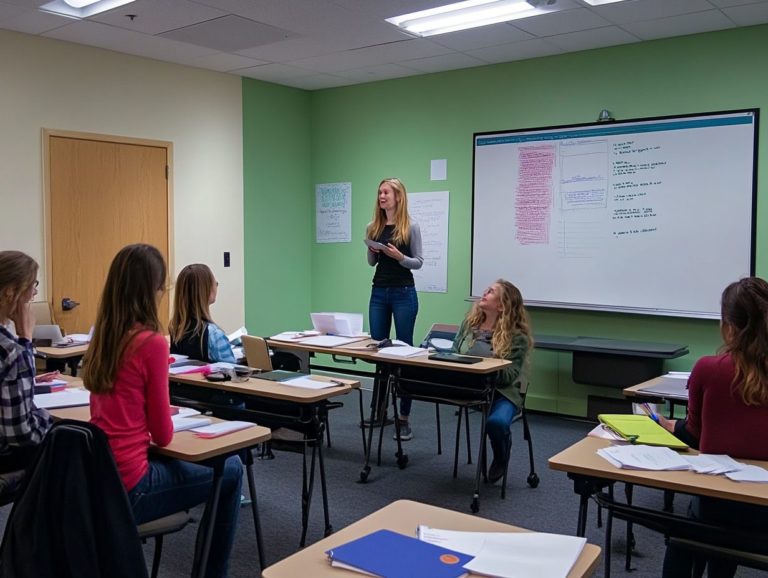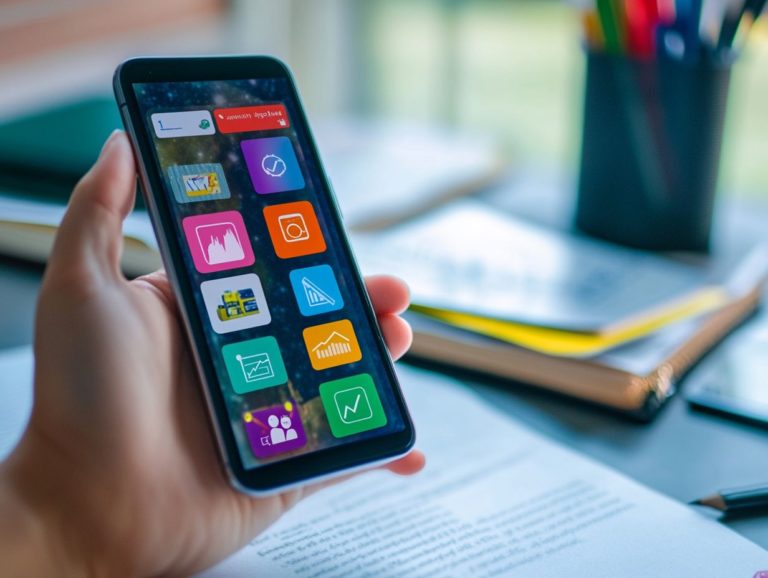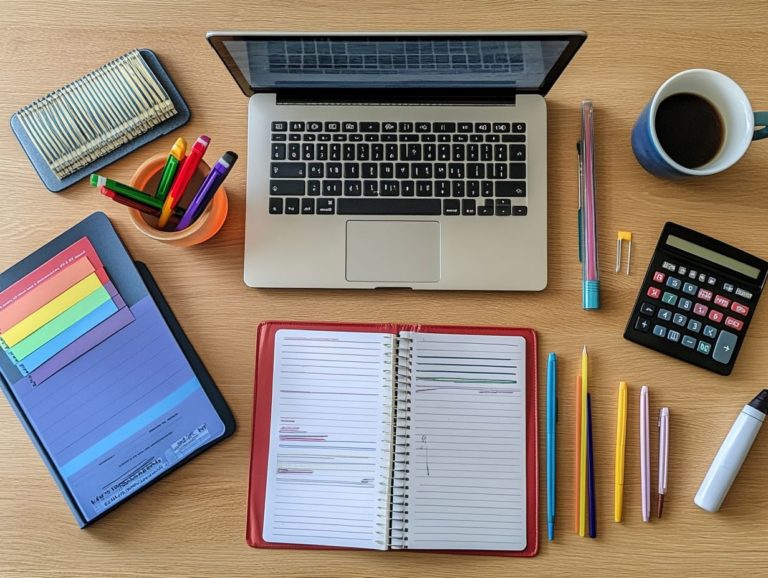effective study plans: practice resource guide
Crafting an effective study plan is your gateway to academic success. However, starting out can feel overwhelming.
This guide helps you uncover your unique learning style and set realistic goals. You will also learn to manage your time effectively.
Dive in and watch your study habits transform!
Contents
- Key Takeaways:
- Creating an Effective Study Plan
- Time Management Techniques for Studying
- Utilizing Study Resources
- Evaluating and Adjusting Your Study Plan
- Frequently Asked Questions
- What is an Effective Study Plan?
- Why is having an Effective Study Plan important?
- How can the Practice Resource Guide help with creating an Effective Study Plan?
- How should I use the Practice Resource Guide?
- Can the Practice Resource Guide benefit all types of learners?
- Is the Practice Resource Guide suitable for all subjects and courses?
Key Takeaways:

Understand your learning style to customize your study plan for maximum effectiveness.
Set realistic goals and prioritize tasks to manage your time well.
Choose the right study materials and use effective note-taking strategies for better retention.
Creating an Effective Study Plan
Crafting an effective study plan is crucial for your academic success. It allows you to organize your study sessions and manage your time wisely.
By developing a personalized study schedule, you can elevate your concentration and reduce distractions. This ultimately enhances your academic performance as you prepare for exams or tackle coursework.
Understanding Your Learning Style
Understanding your learning style is essential for effective study methods. This enhances your retention and comprehension, enabling you to engage meaningfully with the material.
You might find that you lean towards visual aids, benefiting from diagrams and color-coded notes. Others may resonate more with auditory techniques, such as engaging in discussions or listening to lectures.
Some thrive on hands-on experiences and integrate practical approaches into their learning.
By employing active study techniques like mind mapping to visually organize information or retrieval practice to strengthen your memory you can significantly deepen your understanding.
An academic coach can play a pivotal role in this journey. Together, you can unlock amazing learning results by uncovering your unique strengths and customizing study strategies that align with your preferences.
Setting Realistic Goals
Setting realistic goals is essential for crafting an effective study schedule. This aligns your time management with the demands of exam preparation and coursework.
Breaking down larger objectives into smaller, specific tasks allows you to monitor your progress effectively. For example, instead of simply aiming to “study biology,” set a clearer target like “complete chapters 3 and 4 by Wednesday.”
Using planners, digital calendars, or study apps can enhance this process. They offer visual cues and reminders to help keep your priorities straight.
Regularly reviewing these goals cultivates a sense of accomplishment and ensures your study plan can adapt to changing needs and unexpected circumstances.
Time Management Techniques for Studying

Mastering time management techniques for studying is essential to maximize productivity. This ensures your study sessions remain focused and effective.
This approach allows you to cover all necessary material while maintaining high levels of concentration, ultimately enhancing your learning experience.
Prioritizing Tasks and Scheduling Study Time
Prioritizing tasks and scheduling your study time effectively are vital elements of a successful study plan. They enable you to focus on the most important tasks first in your limited time.
To assess the importance of your tasks, start by categorizing assignments based on deadlines and difficulty levels. This way, you can easily distinguish between urgent projects that need immediate attention and those that require a deeper understanding.
Don t overlook those hidden pockets of time moments between classes or during commutes. These present fantastic opportunities for quick review sessions or flashcard drills.
By integrating these brief study bursts into your daily routine, you can achieve consistent progress.
Crafting a realistic schedule that reflects your priorities involves blocking out dedicated time slots for each subject. This ensures that high-priority tasks get the focus they deserve while you maintain a balance between your study commitments and personal life.
Tips for Staying Focused and Avoiding Procrastination
Staying focused and avoiding procrastination are crucial skills for effective studying. They directly impact your concentration levels and overall study efficiency.
Without these abilities, it s easy to feel overwhelmed and unproductive. Create a dedicated study space free from distractions. Using tools like timers to break your study sessions into manageable chunks can make a world of difference.
Incorporate healthy snacks, such as nuts or fruits, to provide the vital nutrients your brain needs to function optimally. Playing calming music in the background can help create a conducive learning environment, drowning out any disruptive noise.
Set clear, achievable goals to combat procrastination and hold yourself accountable. This approach can lead to a more structured and effective study routine, transforming your study habits for the better.
Utilizing Study Resources
Using study resources can profoundly elevate your learning experience. They equip you with essential tools and strategies needed to reinforce your grasp of course materials.
Approaching these resources with intention and focus unlocks the potential to deepen your understanding and excel in your studies.
Choosing the Right Study Materials

Choosing the right study materials can transform your learning journey, especially in technical courses. The quality of these resources directly impacts your academic performance.
To tailor your resources to your preferences, first understand your unique learning style whether you re a visual, auditory, or kinesthetic learner.
If you’re a visual learner, video tutorials and infographics might be your best friends. Auditory learners could thrive with podcasts or recorded lectures. If hands-on activities and experiments are your jam, then kinesthetic learning will suit you well.
Effective study materials can range from detailed textbooks to interactive online platforms and engaging practice exercises that capture your attention.
By assessing these resources, you better align your study habits with your preferred methods, paving the way for significant academic success.
Effective Note-Taking Strategies
Effective note-taking strategies, like the Cornell Notes system and mind mapping, can significantly elevate your engagement with the material. They enhance your memory retention during study sessions.
Leveraging these techniques transforms passive reading into an interactive experience, making it easier to understand and recall information later.
The Cornell Notes system, with its organized layout, encourages you to summarize key points and formulate questions that promote deeper thinking. Mind mapping sparks creativity through visual connections, enabling you to see the relationships between concepts at a glance.
Incorporating these methods into your routine reinforces your learning and cultivates more effective study techniques tailored to your unique preferences.
Evaluating and Adjusting Your Study Plan
Evaluating and adjusting your study plan is essential for maximizing its effectiveness and adaptability. This process enables you to track your progress and make informed changes to your study habits based on performance.
Embracing this dynamic approach ensures you remain aligned with your goals and continuously enhance your learning experience.
Start organizing your study materials today!
Tracking Progress and Making Necessary Changes
Tracking your progress and adjusting your study habits are crucial steps in optimizing your learning and ensuring better memory retention over time.
By employing various methods like setting both short and long-term goals and keeping a dedicated study log you ll see your progress soar! Regularly reviewing this log allows you to find areas to improve.
Use techniques like self-assessment quizzes and spaced repetition a study technique that involves reviewing information at increasing intervals to enhance your understanding. Organizing your study sessions efficiently by breaking down material into manageable chunks and using active recall strategies can significantly boost your retention.
These techniques promote a structured approach to reviewing content and encourage a deeper engagement with the material, ultimately enriching your educational experience.
Frequently Asked Questions

What is an Effective Study Plan?
An effective study plan is a personalized approach to studying that involves setting specific goals, creating a schedule, and utilizing various resources to help students achieve academic success.
Why is having an Effective Study Plan important?
Having an effective study plan helps students manage their time efficiently, stay organized, and improve their understanding of course material. This can lead to better grades and overall academic success.
How can the Practice Resource Guide help with creating an Effective Study Plan?
The Practice Resource Guide provides students with a variety of tools and strategies for effective studying, including time management tips, note-taking methods, and test-taking strategies. It also offers practice questions and exercises to help reinforce learning.
How should I use the Practice Resource Guide?
You can use the Practice Resource Guide as a supplement to your regular study routine. By learning how to use practice resources in subject prep, you can utilize its resources and strategies to improve your study habits and incorporate them into your own personalized study plan.
Can the Practice Resource Guide benefit all types of learners?
Yes, the Practice Resource Guide offers a variety of study strategies that can benefit all types of learners. Whether you are an auditory, visual, or kinesthetic learner, you can find useful tips and resources to enhance your studying experience.
Is the Practice Resource Guide suitable for all subjects and courses?
While the Practice Resource Guide is designed to help students with various courses and subjects, it may not cover every specific topic in depth. To enhance your study experience, consider combining the use of the guide with other course materials and resources provided by your instructors, as well as learning how to create a study plan for exams for a comprehensive approach.
Start improving your study habits now! Track your progress with a study plan today!






